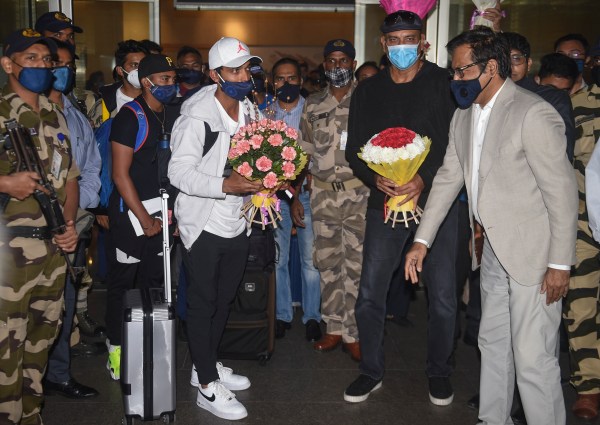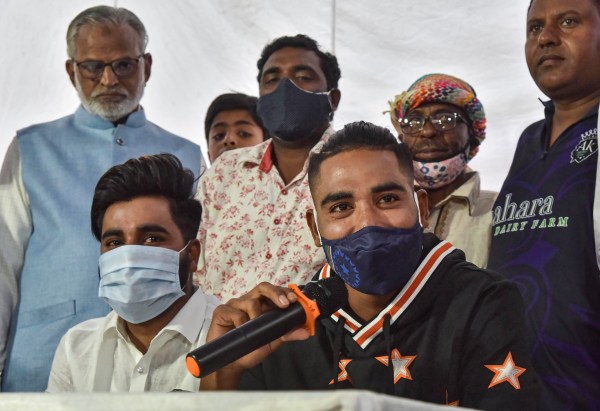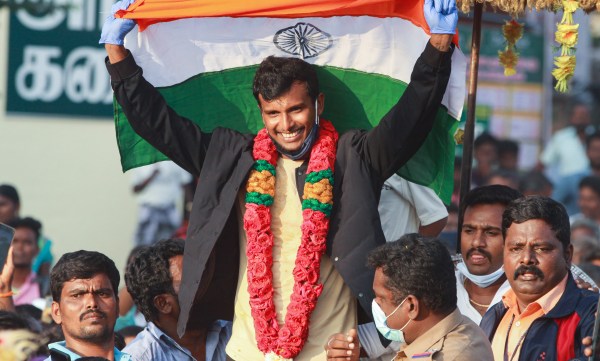 T Natarajan and Mohammed Siraj received a rousing reception at their hometowns. (PTI)
T Natarajan and Mohammed Siraj received a rousing reception at their hometowns. (PTI) ‘Ajinkya aala re, aala (Ajinkya is here)…’ people sang. It didn’t have the grandeur of Shammi Kapoor’s ‘Govinda aala re, aala’, but to paraphrase Ajinkya Rahane’s former Mumbai Ranji team mate Vinayak Samant, the people in and around W-54 housing complex in Matunga revelled in their Amol Palekar-like down-to-earth affinity. India’s (stand-in) captain-fantastic returned home on Thursday morning, and his neighbours and fans rolled out the red carpet.
Rahane has been playing Test cricket since 2013. Never before in his life had he returned home from an overseas tour to such a hero’s welcome. Then again, never before in the history of Indian cricket had the Gabbatoir been breached and a depleted India bounced back so spectacularly to conquer Australia in their own backyard. As the captain, Rahane presided over the turnaround.
The Mumbai contingent in the Indian team – Rahane, Rohit Sharma, Shardul Thakur, Prithvi Shaw and head coach Ravi Shastri – landed in the Maximum City in the morning. The Mumbai Cricket Association (MCA) officials were present to receive them at the airport. A cake was cut there itself to celebrate the achievement.
 Ajinkya Rahane, center left and head coach Ravi Shastri, second right are received by Mumbai Cricket Association President Vijay Patil at the Chhatrapati Shivaji Maharaj International Airport, in Mumbai on Thursday, Jan. 21, 2021. (AP Photo)
Ajinkya Rahane, center left and head coach Ravi Shastri, second right are received by Mumbai Cricket Association President Vijay Patil at the Chhatrapati Shivaji Maharaj International Airport, in Mumbai on Thursday, Jan. 21, 2021. (AP Photo)
At the housing complex in Matunga, where Rahane lives, his fellow residents had organised a special reception. The man of the moment didn’t forget to wear a mask. He held his two-year-old daughter Aarya and was accompanied by wife Radhika. Rose petals were showered on the boy-next-door hero, while the sound of dhols filled the air.
At the ground floor of his apartment, a special board displayed Rahane’s Test record as captain – four wins and a draw in five Tests, and three Test series victories. The 32-year-old stood in front of the specially-designed board, as camera shutters went into overdrive.
Three years ago, Rahane was dropped from the Test XI in South Africa despite having the best overseas batting average in the group at that time. Cricket is a great leveller.
About 100 kilometres away, firecrackers greeted Shardul Thakur’s homecoming at Palghar. Thakur’s seven wickets and 67 runs in the first innings in Brisbane proved to be game-changing.
‘We will play’
Upon his arrival in Hyderabad, Mohammed Siraj headed straight to his father’s grave from the airport. Siraj’s father, Mohammed Ghouse, breathed his last on November 20. The Indian team management gave the option to the 26-year-old pacer to return home, but Siraj chose to stay and ended up being the most successful Indian bowler in the Test series – 13 wickets from three matches.
In Sydney, he and Jasprit Bumrah were allegedly racially abused by some fans. During a press conference later in the day, Siraj said that match officials had allowed the Indian team the liberty to leave the game following the incident, but Rahane turned down the offer.
 Mohammed Siraj speaks to media personnel after his arrival in the city, at his residence in Hyderabad on Thursday, Jan. 21, 2021. (PTI Photo)
Mohammed Siraj speaks to media personnel after his arrival in the city, at his residence in Hyderabad on Thursday, Jan. 21, 2021. (PTI Photo)
“I faced abuses in Australia. The case is going on, let’s see whether I get justice or not. My job was to report the incident to the captain,” Siraj told reporters, adding: “The umpires offered us to leave the game but Rahane bhai said we won’t leave the game. ‘We did no mistake, so we will play’. The abuses which I faced in Australia made me mentally stronger. I didn’t let them affect my game.”
India lodged an official complaint with ICC match referee David Boon and Cricket Australia offered an unreserved apology for the incidents.
Natarajan rides a chariot
Down south in Salem, T Natarajan was put on a chariot, as hundreds gathered on the streets to celebrate one of the most heart-warming stories in Indian cricket. For someone from Chinnappampatti, a village 36 kilometres off Salem in Tamil Nadu, it’s been a fairy-tale rise for the 29-year-old. His hardship as a child and teenager and how without his exceptional cricket skills, he could have ended up as a weaver like his father have been well documented.
 Left-arm pacer T Natarajan gestures during a grand welcome ceremony, organised by his villagers, at Chinnappampatti in Salem district, Thursday, Jan. 21, 2021. (PTI Photo)
Left-arm pacer T Natarajan gestures during a grand welcome ceremony, organised by his villagers, at Chinnappampatti in Salem district, Thursday, Jan. 21, 2021. (PTI Photo)
Natarajan went to Australia as a net bowler, made a seamless progression to white-ball internationals and returned home as a Test cricketer after playing at the Gabba. His team mate from Tamil Nadu, Washington Sundar, would be late to check in, scheduled to return home in the early hours on Friday.
Quarantine relaxation
Meanwhile, the Indian team’s Mumbai-based cricketers have been granted ‘special exemption’ from the mandatory 14-day quarantine rule after returning from overseas. The stipulation includes a seven-day quarantine in a hotel provided the in-bound passengers test negative at the airport.
But the home Test series against England is commencing on February 5 and the players will have to report in Chennai on January 27. After about six months in various bio-bubbles, for the Indian Premier League and in Australia, they will enter another bubble for the next series. Family time would be short, but that’s how it is in a Covid-affected world.